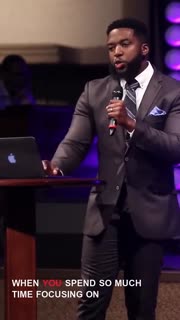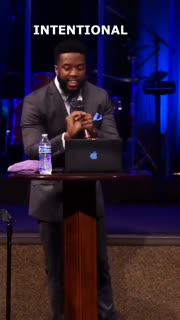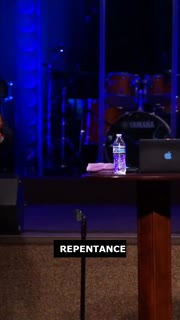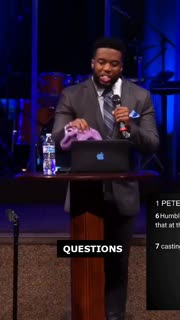Busting Myths: Understanding God's Word and Repentance
Summary
### Summary
Today, we delved into the topic of "Mythbusters," focusing on the question, "Did God really say that?" We began by exploring the story of Adam and Eve in Genesis 3, where the serpent deceives Eve into eating the forbidden fruit. This narrative serves as a backdrop to examine the myths that often cloud our understanding of God's word and our relationship with Him.
The first myth we tackled is the notion that repentance isn't necessary because we are saved by grace. This is a dangerous misconception. True repentance is not just about feeling sorry but about turning away from sin and moving towards God. Repentance is an act of worship that brings us closer to God and aligns us with His will.
The second myth is the belief that we can have both the world and God because "God knows my heart." This is a flawed understanding. When we stand too close to temptation, we are more likely to fall. The story of David and Bathsheba illustrates this point vividly. David was not where he was supposed to be, which led to his downfall. Similarly, we must be vigilant about our surroundings and the influences we allow into our lives.
The third myth is the idea that we can't ask God questions because it means we don't trust Him. This is far from the truth. The Bible is filled with examples of people who questioned God, seeking clarity and understanding. Asking questions leads to a deeper relationship with God and helps us to understand His will better.
In conclusion, we must be diligent in busting these myths and seeking the truth in God's word. We must repent genuinely, avoid standing too close to temptation, and not be afraid to ask God questions. By doing so, we can live a life that is truly aligned with God's will and purpose for us.
### Key Takeaways
1. Repentance as Worship: True repentance is not merely an apology but a transformative act of worship. It involves turning away from sin and moving towards God, aligning our lives with His will. This act of repentance brings us closer to God and allows us to experience His grace and forgiveness fully. [45:52]
2. Avoiding Temptation: Standing too close to temptation makes it easier to fall. Like David, who was not where he was supposed to be, we must be vigilant about our surroundings and the influences we allow into our lives. Being in the right place, both physically and spiritually, helps us avoid the pitfalls of sin. [59:47]
3. Asking God Questions: It is not a lack of faith to ask God questions; rather, it is a sign of seeking deeper understanding. The Bible is filled with examples of people who questioned God, and through their questions, they gained clarity and grew in their faith. Asking questions leads to clarity, while assumptions lead to confusion. [06:18]
4. The Danger of Dual Allegiances: Believing that we can serve both God and the world is a dangerous myth. When we try to balance both, we often end up compromising our faith. We must choose to fully commit to God, understanding that He requires our complete devotion and not a divided heart. [52:54]
5. The Importance of Scripture: Many misconceptions arise from a lack of understanding of Scripture. We must be diligent in studying the Bible to discern what God truly says. Misquoting or misunderstanding Scripture can lead us astray, but a deep, accurate understanding of God's word keeps us grounded in truth. [53:27]
### YouTube Chapters
[0:00] - Welcome
[30:34] - Introduction and Praise
[31:12] - Personal Background
[32:08] - Reading of Genesis 3:1-13
[35:07] - Prayer and Acknowledgments
[36:18] - Mythbusters Introduction
[38:02] - The Significance of Actions
[41:14] - The Two Trees in the Garden
[42:51] - The Importance of Consuming God's Word
[45:52] - Myth 1: Repentance Isn't Necessary
[49:47] - The Story of Gideon
[52:54] - Myth 2: I Can Have Both
[56:55] - The Danger of Standing Too Close to Temptation
[59:47] - The Story of David and Bathsheba
[06:18] - Myth 3: I Can't Ask God Questions
[12:31] - The Importance of Asking Questions
[19:27] - The Might of God
[24:38] - Closing Prayer and Call to Action
Study Guide
### Bible Reading
- Genesis 3:1-13
- Romans 6:16-18
- 2 Samuel 11:1-5
### Observation Questions
1. In Genesis 3:1-13, what specific command did God give Adam and Eve regarding the trees in the garden? How did the serpent challenge this command? [32:40]
2. According to Romans 6:16-18, what are the consequences of being a slave to sin versus being a slave to obedience?
3. In 2 Samuel 11:1-5, what was David doing when he first saw Bathsheba, and why was this significant? [59:47]
### Interpretation Questions
1. How does the story of Adam and Eve in Genesis 3 illustrate the danger of misunderstanding or misquoting God's word? [32:40]
2. What does Romans 6:16-18 suggest about the importance of repentance and obedience in the life of a believer? How does this align with the sermon’s point about repentance being an act of worship? [51:52]
3. How does David's failure to be where he was supposed to be in 2 Samuel 11:1-5 serve as a warning about the dangers of standing too close to temptation? [59:47]
### Application Questions
1. Reflect on a time when you misunderstood or misquoted a Bible verse. How did it affect your actions or beliefs? What steps can you take to ensure a better understanding of Scripture in the future? [53:27]
2. The sermon emphasized that true repentance involves turning away from sin and moving towards God. Is there a specific sin you need to turn away from? What practical steps can you take this week to move towards God? [52:18]
3. David’s story with Bathsheba highlights the danger of being in the wrong place at the wrong time. Are there environments or situations in your life that you need to avoid to prevent falling into temptation? How can you change your surroundings to support your spiritual growth? [59:47]
4. The sermon mentioned that asking God questions is a sign of seeking deeper understanding. What questions do you have for God right now? How can you seek answers through prayer, Bible study, or counsel from mature Christians? [06:18]
5. The myth that we can serve both God and the world was debunked in the sermon. Are there areas in your life where you are trying to balance both? What changes can you make to fully commit to God? [52:54]
6. The importance of Scripture was highlighted as a way to avoid misconceptions. How can you incorporate more Bible study into your daily routine? What resources or methods might help you stay consistent? [53:27]
7. Reflect on the idea that assumptions lead to confusion while questions lead to clarity. How can you cultivate a habit of asking questions and seeking clarity in your spiritual journey? [12:31]
Devotional
Day 1: Repentance as a Transformative Act of Worship
True repentance is not merely an apology but a transformative act of worship. It involves turning away from sin and moving towards God, aligning our lives with His will. This act of repentance brings us closer to God and allows us to experience His grace and forgiveness fully. Repentance is a continuous process that requires humility and a genuine desire to change. It is not about perfection but about a sincere effort to live according to God's standards.
Repentance is also an acknowledgment of our need for God's grace. It is a way of saying that we cannot do it on our own and that we need His help to overcome our weaknesses. When we repent, we open ourselves up to God's transformative power, allowing Him to work in our lives and make us more like Him. This process of transformation is a lifelong journey, but it is one that brings us closer to God and helps us to live a life that is pleasing to Him. [45:52]
Joel 2:12-13 (ESV): "Yet even now," declares the Lord, "return to me with all your heart, with fasting, with weeping, and with mourning; and rend your hearts and not your garments." Return to the Lord your God, for he is gracious and merciful, slow to anger, and abounding in steadfast love; and he relents over disaster.
Reflection: Think of a specific sin or habit you need to turn away from. How can you take a concrete step towards repentance today, and what would that look like in your daily life?
Day 2: The Danger of Dual Allegiances
Believing that we can serve both God and the world is a dangerous myth. When we try to balance both, we often end up compromising our faith. We must choose to fully commit to God, understanding that He requires our complete devotion and not a divided heart. This means making difficult choices and sometimes sacrificing things that are important to us in order to stay true to our faith.
The story of David and Bathsheba illustrates the danger of dual allegiances. David's failure to be where he was supposed to be led to his downfall. Similarly, when we allow ourselves to be influenced by the world, we are more likely to fall into temptation. We must be vigilant about our surroundings and the influences we allow into our lives. Being in the right place, both physically and spiritually, helps us avoid the pitfalls of sin. [52:54]
James 4:4 (ESV): "You adulterous people! Do you not know that friendship with the world is enmity with God? Therefore whoever wishes to be a friend of the world makes himself an enemy of God."
Reflection: Identify one area in your life where you are trying to balance both worldly desires and your faith. What steps can you take to fully commit that area to God today?
Day 3: Avoiding Temptation by Being Vigilant
Standing too close to temptation makes it easier to fall. Like David, who was not where he was supposed to be, we must be vigilant about our surroundings and the influences we allow into our lives. Being in the right place, both physically and spiritually, helps us avoid the pitfalls of sin. This requires us to be intentional about the environments we place ourselves in and the people we surround ourselves with.
Avoiding temptation also means being proactive in our spiritual lives. We must regularly engage in practices that strengthen our faith, such as prayer, Bible study, and fellowship with other believers. These practices help us to stay grounded in our faith and less susceptible to the temptations of the world. By being vigilant and proactive, we can create a spiritual environment that supports our commitment to God. [59:47]
1 Corinthians 10:12-13 (ESV): "Therefore let anyone who thinks that he stands take heed lest he fall. No temptation has overtaken you that is not common to man. God is faithful, and he will not let you be tempted beyond your ability, but with the temptation he will also provide the way of escape, that you may be able to endure it."
Reflection: Think about a recent situation where you were tempted. What could you have done differently to avoid that temptation, and how can you apply that lesson to future situations?
Day 4: The Importance of Asking God Questions
It is not a lack of faith to ask God questions; rather, it is a sign of seeking deeper understanding. The Bible is filled with examples of people who questioned God, and through their questions, they gained clarity and grew in their faith. Asking questions leads to clarity, while assumptions lead to confusion. It is important to approach God with a humble heart, seeking to understand His will and purpose for our lives.
When we ask God questions, we open ourselves up to a deeper relationship with Him. It shows that we are engaged in our faith and that we desire to know Him more intimately. God welcomes our questions and is always ready to provide us with the wisdom and understanding we need. By asking questions, we can grow in our faith and develop a more profound relationship with God. [06:18]
Jeremiah 33:3 (ESV): "Call to me and I will answer you, and will tell you great and hidden things that you have not known."
Reflection: What is one question you have been hesitant to ask God? Take a moment to pray and ask Him that question, seeking His wisdom and understanding.
Day 5: The Importance of Scripture in Discerning Truth
Many misconceptions arise from a lack of understanding of Scripture. We must be diligent in studying the Bible to discern what God truly says. Misquoting or misunderstanding Scripture can lead us astray, but a deep, accurate understanding of God's word keeps us grounded in truth. This requires us to be intentional about our Bible study, seeking to understand the context and meaning of the passages we read.
Studying Scripture is not just about gaining knowledge; it is about allowing God's word to transform our lives. As we study the Bible, we should be open to the ways in which God wants to speak to us and change us. By immersing ourselves in Scripture, we can develop a deeper relationship with God and a clearer understanding of His will for our lives. [53:27]
2 Timothy 2:15 (ESV): "Do your best to present yourself to God as one approved, a worker who has no need to be ashamed, rightly handling the word of truth."
Reflection: How can you make your Bible study more intentional and meaningful? What specific steps can you take to ensure that you are accurately understanding and applying God's word in your life?
Quotes
### Quotes for Outreach
1. "We are talking about the King of Kings and the Lord of Lords. We are talking about the one who sits high and looks low and loves you in spite of who you are, in spite of everything you did. Y'all a little quiet on this side. I'm talking about the true and living God, the one that loves everything about who you are as you are at this very moment." [30:34] (20 seconds)
2. "When you spend so much time focusing on the one tree that you can't consume, you lose appreciation for the tens of thousands of trees that you can consume. You lose appreciation for the majority because you can't help but focus on the one thing that God said not to do." [41:14] (20 seconds)
3. "It takes intentional efforts to grow a healthy relationship with God. Amen. The relationship is healthiest not just when you don't consume. The relationship is actually healthiest when you learn what to do after you've consumed." [44:27] (17 seconds)
4. "Repentance is not just necessary but it's a beautiful thing when you understand it. See Paul says in Romans chapter 6 that we are no longer slaves to sin. He goes on to say that we are slaves to whatever we choose to obey. Whatever you obey you're consumed by and whatever you're consumed by controls you." [48:50] (25 seconds)
5. "If you are filled first with the word of God, if you are filled first with knowing what you are grounded in, if you are filled first with knowing the things that God told you to do, battling temptation will be a lot easier because you will look at the wrong thing and say I'm not worried about you." [01:05:23] (20 seconds)
### Quotes for Members
1. "When you are consumed by what you're supposed to have, you lose focus and interest for the things that you aren't supposed to have. There was a research group that interviewed and surveyed a group of pastors and leaders of the local church... They reported on average this was just on average they said during a 30-minute sermon 10 of those minutes people are scrolling on social media." [42:51] (60 seconds)
2. "Blame always leads to defiance, ownership leads to repentance. Blame leads to defiance, ownership leads to repentance. Look at Judges 6 and 7. Judges 6 and 7 verses 14 to 15... Gideon is petitioning you skipped about 45 people and you came to me I have no reason to believe." [49:47] (60 seconds)
3. "Repentance is when you turn say God I'm sorry I'm going to go this direction now God I'm sorry I know that what I did was wrong but I want to seek your face more than I want to seek those problems I know that what I did was wrong I know that what I did you didn't approve of but I don't want to feel disconnected from you anymore so help me to take steps in the direction that leads me straight to you." [52:18] (28 seconds)
4. "If you're wondering why it's so hard for you to live right maybe you're standing too close to that one thing that keeps tempting you. You keep acting like it's God's fault you keep acting like it's the devil's fault it's you it's me the devil didn't do that God didn't do that either that's your ego thinking that in your own strength you can fight this and you can't." [58:37] (26 seconds)
5. "Questions lead to clarity, assumptions lead to confusion. Questions lead to clarity, assumptions lead to confusion. You know the only thing missing from Adam and Eve's story in Genesis 3 they didn't ask God questions which lead to confusion left them confused." [01:12:01] (26 seconds)










